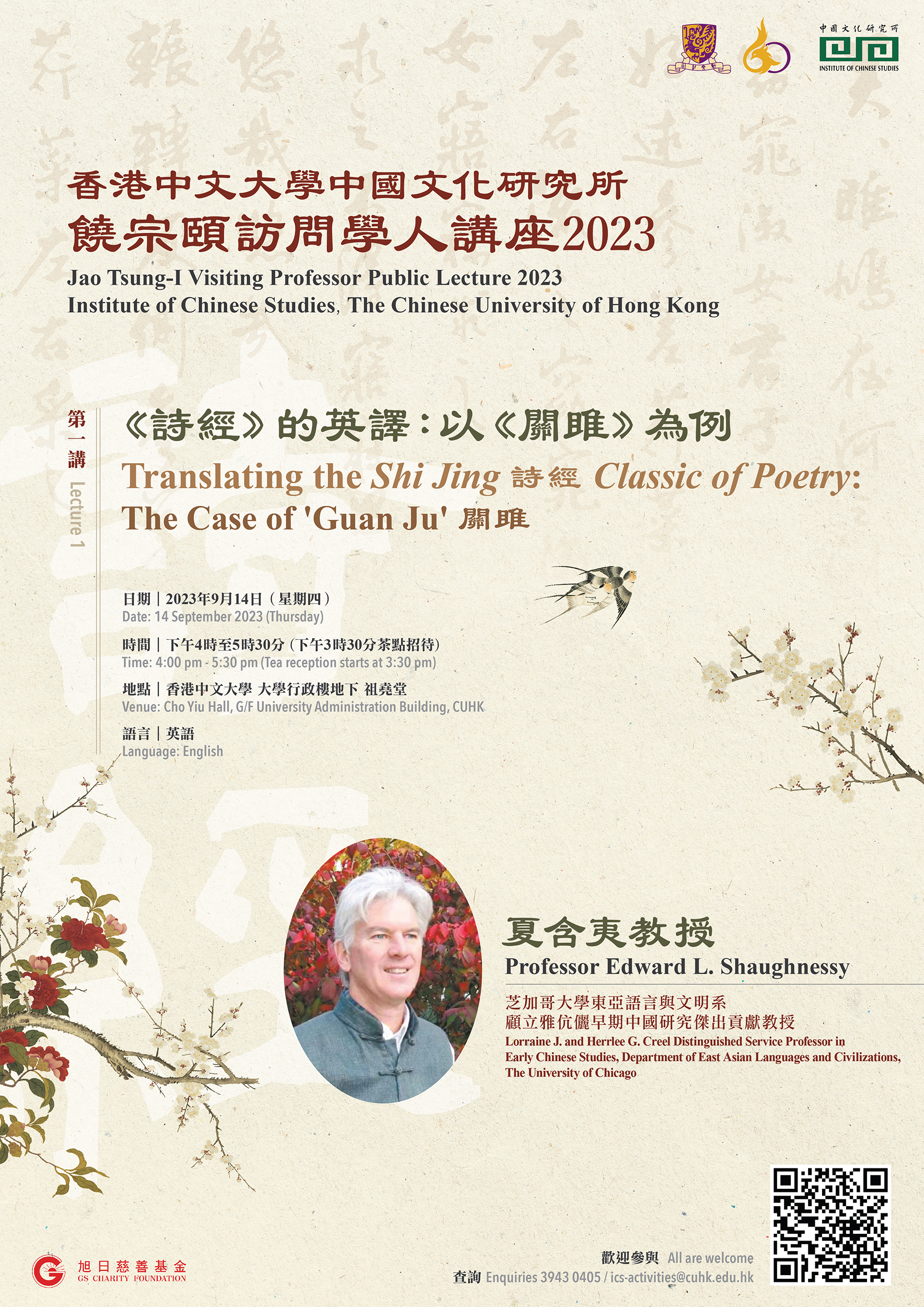Events
The Chinese University of Hong Kong Jao Tsung-I Visiting Professor Public Lecture 2023, by Professor Ed. L. Shaughnessy, "Translating the Shi Jing 詩經 Classic of Poetry: The Case of Guan Ju 關雎"
14 Sep 2023
14 September 2023 (Thursday) 4:00 p.m. – 5:30 p.m. (Tea reception starts at 3:30 p.m.)
Cho Yiu Hall, G/F University Administration Building, CUHK.
Professor Edward L. Shaughnessy
Jao Tsung-I Visiting Professor, The Chinese University of Hong Kong
Lorraine J. and Herrlee G. Creel Distinguished Service Professor of Early Chinese Studies, Department of East Asian Languages and Civilizations, The University of Chicago
Edward L. Shaughnessy is the Lorraine J. and Herrlee G. Creel Distinguished Service Professor of Early Chinese Studies in the Department of East Asian Languages and Civilizations of the University of Chicago. He was born on 29 July 1952 in Sewickley, Pennsylvania, USA, and received a B.A. (Theology, 1974) from the University of Notre Dame and M.A. (1980) and Ph.D. (Asian Languages, 1983) degrees from Stanford University. In addition, he studied with Aisin-gioro Yu-yun 愛新覺羅毓鋆 in Taipei, Taiwan for three years (1974-1977). He joined the faculty of the University of Chicago in 1984 and has remained there throughout his career. He lives with his wife, Elena Valussi, and their two children, Giulia and Maria, in Chicago and in Verona, Italy.
Most of his career has been devoted to the cultural and literary history of China’s Zhou dynasty (c. 1045-249 B.C.), the period that has served all subsequent Chinese intellectuals as the Golden Age of Chinese civilization. Much of his work has focused on archaeologically recovered textual materials from this period, from inscriptions on ritual bronze vessels cast during the first centuries of the first millennium B.C. through manuscripts written on bamboo and silk during the last centuries of the millennium. At the same time, he remains fascinated with the received literary tradition of the period, especially the three classics: Zhou Yi or Zhou Changes (better known in the West as the I Ching or Classic of Changes), Shang Shu or Exalted Scriptures (also known as the Shu Jing or Classic of History) and Shi Jing or Classic of Poetry. An important aspect of his scholarly work has been the attempt to bridge western and Chinese traditions of scholarship. To this end, he has written much of his technical scholarship in Chinese, half of his twenty published books being in Chinese.
Please click here to register.
For enquiries, please contact Ms. Tiffany YUNG via 3943 0405 or ics-activities@cuhk.edu.hk.
Since its inception in 1963, CUHK has devoted itself to the modernization and promulgation of Chinese culture through studies in the humanities and social sciences. Professor Jao Tsung-I was an advocate of sinology through his immense contribution in boosting the academic and cultural exchanges between China and the West. CUHK shares the same mission to inherit and promote Chinese culture. In 2013, CUHK set up the Visiting Professorship Scheme under the Institute of Chinese Studies and the University is truly honoured to have this Scheme named after Professor Jao Tsung-I. GS Charity Foundation was founded in 2005, and it has kindly supported the promotion of Chinese culture. Institute of Chinese Studies, The Chinese University of Hong Kong was honoured to be commissioned as the window to popularise traditional Chinese culture through organising a series of cultural activities. Thanks to the generous donation from GS Charity Foundation of amount HK$1 million annually since 2015, ICS has promoted Chinese history and culture through hosting “Jao Tsung-I Visiting Professor Public Lecture”.
Through this Scheme, a world-class scholar on Chinese cultural research is invited for academic research and scholarly exchange at the Institute of CUHK every year. It is hoped that the Jao Tsung-I Visiting Professor will be able to inspire the young generation and further promote Chinese culture. This year, it is our great honour to welcome Edward L. Shaughnessy as the Jao Tsung-I Visiting Professor.
“Translating the Shi Jing 《詩經》 Classic of Poetry: The Case of Guan Ju 《關雎》”.
The poem ‘Guan Ju’ 《關雎》is the first poem in the Shi Jing 《詩經》 Classic of Poetry, and thus perhaps the best known poem in the entire Chinese poetic tradition. As such, it is an excellent case to test translation strategies, both for the Shi Jing in particular and for all of Chinese poetry in general. In this talk, I will examine about twenty different English translations of this one poem and will discuss such features as word choice, meter and rhyme, as well as the translators’ overall understanding of the poem’s intention. Finally, I will present my own translation in which I stress word choice and meter, and suggest that it is possible to use English iambic tetrameter to approximate the Classic of Poetry’s well-known four-character lines. Finally, I will also suggest that “Guan Ju” was originally a love song, and that the political turn in its interpretation fails to translate into proper Chinese the osprey’s call that opens the poem.




